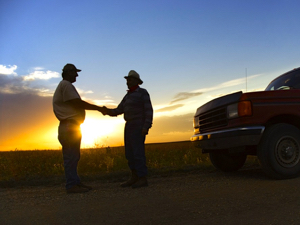How to separate the family system from the business system

When the next generation comes home, Elaine Froese says families can set up some rules of engagement right away so everyone knows and can operate within that culture. When new people join the team, it can help to clarify expectations. “Culture is the invisible glue that holds the farm and the family together. It is what they believe in terms of values, how they behave and ways they make decisions,” she says.
This culture can help families when navigating through transition planning. “Believe. Behave. Decide. This is a great mantra for the farm family team to navigate all the vital plans that are part of transition,” says Froese. “They agree to communicate. They have a healthy approach to resolving conflict. They know the difference between an estate plan and a succession plan.”
And most importantly, she says to separate the family system from the business system. “My husband will always be the dad to our son, but in business they are business partners, working shoulder to shoulder. Be clear about the family roles and business roles.”
Younger farmers need to communicate their expectations with respect and learn to put themselves in the older person’s perspective to resolve conflict and address fears. It’s good to remember why younger folks came home and older farmers need to remember they’re not 21 years old anymore. “It takes courage and real intention to ask what needs to shift on the family dynamic and culture for folks to operate well together,” she says.
Here are seven rules of behaviour to help establish culture and navigate transition:
1. What does this family believe?

What are our core values? Froese uses a values indicator tool to help determine each person’s top seven values, or her own simple values cloud. It’s helpful to see the commonalities and differences.
2. Respect

A constructive cornerstone of good conflict resolution is the ability to see one another’s perspective. Keep short accounts and have a culture of making quick repairs. You need to be adaptable.
3. Share emotions

Be able to say terms like “I think, I feel, I need, I want.” This decreases assumptions, and makes communication more direct.
4. Honesty

This helps with financial transparency for growing a business that is based on openness and wide discussion.
5. Ask for what you need

People are happy when they feel their needs are being met. Love does not read minds. You get the behaviours you accept, so what types of behaviours are you accepting that need to change?
6. Explain the “why” of your decisions

Ideally, a collaborative decision-making model is an ideal way to conduct business. People can have their own enterprise decisions, but when you are mentoring and training the next generation for management, the skills of critical thinking and decision-making should be shared both ways. Being able to clearly share your intent is a huge conflict resolution skill.
7. Accountability

Who is going to ensure that things get done? Ideally each farm team member has the passion, drive and maturity to get their tasks done. Trust, conflict resolution, attention to results, commitment to act, and accountability are needed for teams to function properly.













